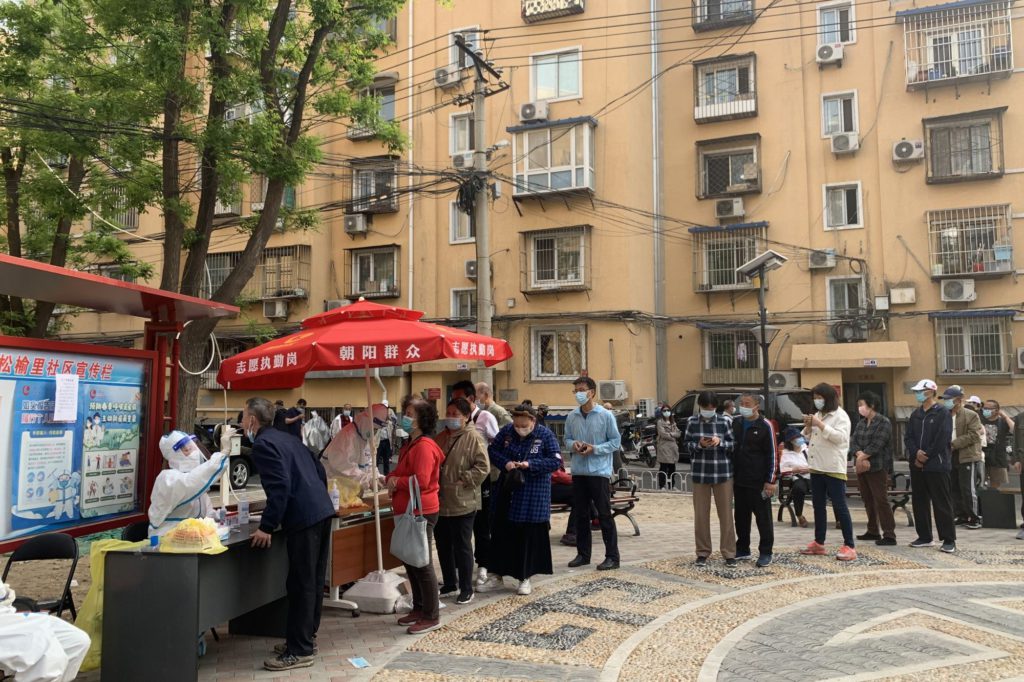(Bloomberg) — China’s coronavirus outbreak worsened as rising cases in Beijing sparked jitters about an unprecedented lockdown of the capital, with policy makers racing to avert a Shanghai-style crisis that’s already wrought havoc on the financial hub.
Worries that the country’s strict adherence to Covid Zero will further damage the economy dragged down stocks to oil and iron ore on Monday. It’s also sparked a bout of panic buying as Beijing residents — fearful of being caught unprepared in the event of a citywide shutdown– rushed to stock up on food and other supplies after the government announced mass testing plans and put some areas under lockdown.
Read more: Why China Is Sticking With Its Covid Zero Strategy
The city of more than 20 million people and the country’s political center locked down parts of the eastern district of Chaoyang, though supermarkets remain open, with plans to ease restrictions after residents complete a testing regimen on April 27. Officials have warned of more cases in coming days, with Beijing city government spokesman Xu Hejian saying late on Friday that the current outbreak is “complex and stealthy” while vowing to take further measures to prevent its spread.
The flareup comes as Shanghai reported a record number of fatalities and imposed stricter rules to try and stamp out infections. The twin outbreaks in two of China’s most significant cities has become an unprecedented test for President Xi Jinping, who is likely to seek a third five-year term during a Communist Party congress later this year.
China has repeatedly defended Covid Zero, saying the policy saves lives and keeps the economy going, even as the strategy increasingly darkens the country’s growth outlook and threatens to disrupt global supply chains.
Read more: Xi Defends China’s Covid Response Amid Mounting Economic Woes
Chinese stocks slumped and the onshore yuan fell to its weakest level in 17 months. Iron ore futures tumbled more than 11%, while oil slid almost 5% to trade below $98 a barrel.
The Chaoyang district is home to some 3.5 million people, including many expats, the central business district and most foreign embassies. Authorities have designated 14 smaller communities as “sealed” and another 14 as “controlled” areas with different levels of movement restrictions.
Local authorities will test people who live or work in Chaoyang on Monday, Wednesday and Friday. That’s everyone from white collar workers to young children who need a negative result to attend kindergarten.
Long lines are already snaking around apartment complexes as residents wait for tests. Online and brick-and-mortar grocery stores have sold out of fresh food, kitchen staples and other basics like masks and antiseptic. Officials said in a Monday afternoon briefing that some stores are stocking up supplies to three times the sale volume of normal times to accommodate surging demand.
The city reported 29 new local Covid infections in the 24 hours through 4 p.m. local time, bringing the total caseload since Friday to 70. More than half are in Chaoyang.
Read more: Xi Moves to Stop Shanghai Covid Rage From Sweeping Across China
Residents in the capital are worried about a repeat of the crisis that’s snarled Shanghai for almost a month and seen people unable to reliably access food or medical care. Beijing authorities are beefing up supplies, delivering fresh vegetables to parts of Chaoyang that have reported positive cases. Meituan and other grocery delivery apps have also increased manpower by as much as 70% to help sort mounting orders and race to deliver them to people’s doorsteps on the same day, local media reported.
In Shanghai, the misery continues with officials ramping up containment efforts as cases in the community continue to crop up despite mass isolation, testing and lockdowns. Over the weekend, fences were installed in some neighborhoods to seal buildings where positive cases have been found, sparking renewed frustration among residents already stuck inside their homes for weeks.
Read more: Shanghai Pens in Residents in Renewed Effort to Stamp Out Covid
The financial hub remains the epicenter of China’s worst outbreak since Wuhan more than two years ago. It reported 51 fatalities on Sunday, mostly elderly people, which took deaths in the current wave to 138. There are 196 patients in severe condition and 23 in critical condition.
China has dispatched a total of nine medical teams to step up treatment of severe cases to eight designated hospitals in Shanghai, Xinhua reported on Sunday. The teams are composed of over 360 experts with intensive care experience.
Shanghai reported 19,455 new cases on Sunday. While daily infection numbers are on a broadly downward trend, the government still hasn’t reached its goal of eliminating spread in communities.
So far 88% of China’s 1.4 billion people have been fully vaccinated and half of the country’s population have received booster shots. Among those aged 60 or above, 81% have been fully vaccinated, according to the National Health Commission last week.
(Updates to add details throughout.)
More stories like this are available on bloomberg.com
©2022 Bloomberg L.P.











